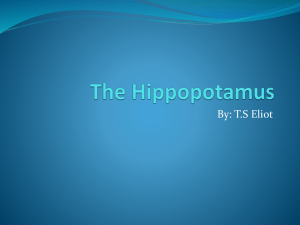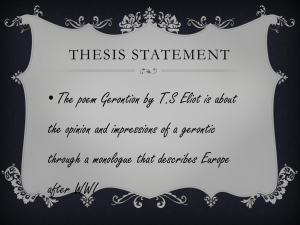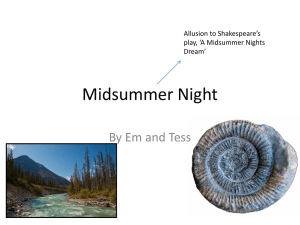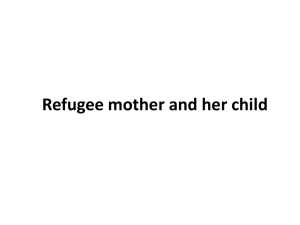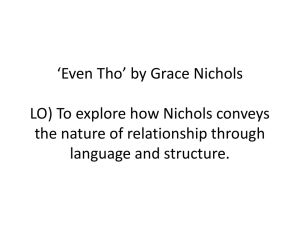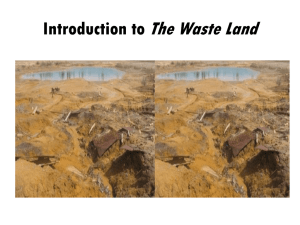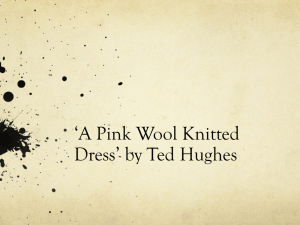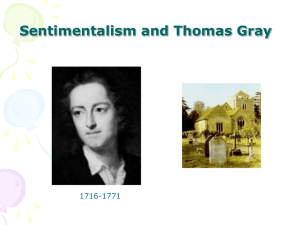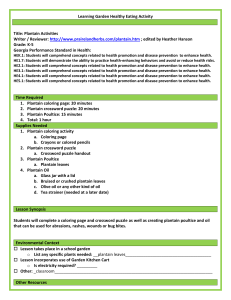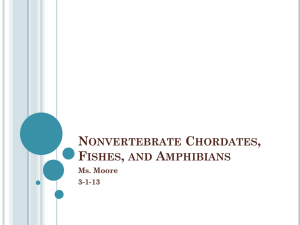Praise Song For My Mother slideshow
advertisement
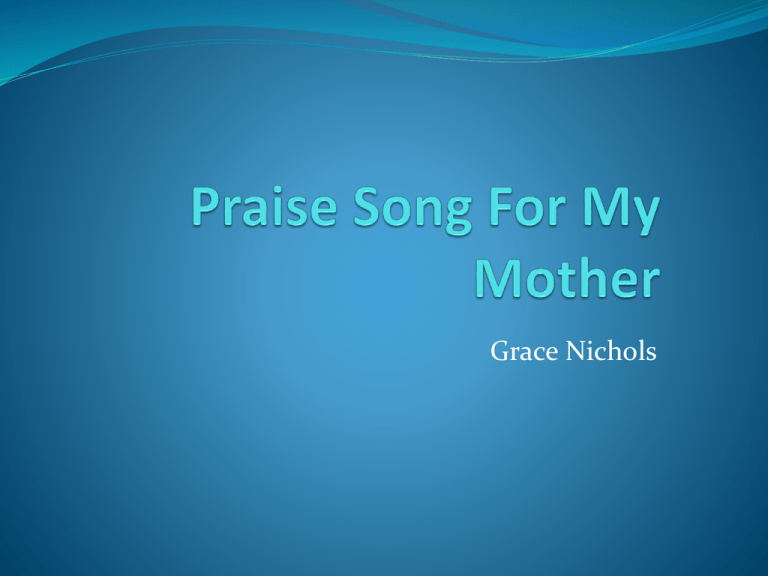
Grace Nichols Background – Grace Nichols Grace Nichols is a Guyanese poet. She was born in Georgetown (a small coastal village), Guyana, in 1950. After working in Guyana as a teacher and journalist, she immigrated to the UK in 1977 at the age of 27 Much of her poetry is characterised by Caribbean rhythms and culture, and influenced by West Indian folklore. She often incorporates cultural displacement, elements/nature and embracing diversity Praise Song The Praise song originated from West Africa. It is created to celebrate and appreciate the life of a person. In this case, Nichols appears to be celebrating the life of her mother. The title of this poem also sets a cultural background Stanza 1 You were water to me deep and bold and fathoming “were” is in past tense. This suggests that the speaker’s mother was an ever present figure in her life, and that now she is no longer there with her “water” – water is a basic need for survival. Shows that her mother was someone that was essential and surrounded her life The last line uses adjectives to show appreciation: “deep and bold and fathoming” - her mother was understanding of her, had depth, was thoughtful. Stanza 2 You were moon’s eye to me pull and grained and mantling “moon” – a sacred image that is a symbol for her mother, she was gentle in nature, caring and motherly. “eye” shows that she always watched out for her “pull” –the pull her mother had on her and the influence she had on her as a child “grained” – reference to seeds. She has grown and has been nurtured as a seedling in her mother’s care “mantling” – connotations of her mother being part of her foundation and her life, shows stability Stanza 3 You were sunrise to me rise and warm and streaming “sunrise” – her mother was there at the start of every new day, also could be a reference to birth which shows how pivotal woman are “rise” – gave her confidence, raised her up and gave direction “warm” –was a temperate person, trusting, loving “streaming” – her love for her was unconditional, constant, always spreading Stanza 4 You were the fishes red gill to me the flame tree’s spread to me the crab’s leg/the fried plantain smell replenishing replenishing Go to your wide futures, you said “the fishes red gill” – a fish’s gill is vital for its survival; in this way her mother was someone she always depended on “the flame trees spread to me” – gave her shelter and protection, also symbolizes life and growth “the crabs leg/the fried plantain smell” – her mother provided her with food and nourishment, creates a mood that is homely “replenishing” – gave her life, fulfilment, nurturing Structure You were water to me deep and bold and fathoming You were moon’s eye to me pull and grained and mantling You were sunrise to me rise and warm and streaming You were the fishes red gill to me the flame tree’s spread to me the crab’s leg/the fried plantain smell replenishing replenishing Go to your wide futures, you said The first three stanzas are organized in a stair-like structure with mostly the same number of syllables (2,4,7). The uniform structure reflects stability in childhood. The final stanza changes with an extra line that interrupts the pattern – this breaking down could show how the speaker is at the end of childhood, and is now going into adulthood. It could also suggest that there has been a change in the relationship with her mother, as adulthood leads to different treatment and a lack of structure. Language Features Repetition: Repetition of “You were” emphasizes how her mother was an important figure in her life by being there every day to support her. Metaphors: The metaphors that Nichols uses to describe the importance of her mother are all drawn from the physical world – the things that surrounded her in her childhood: ‘water’, ‘moon’, ‘sunrise’, ‘fishes’, flame tree’, ‘crab’ and ‘plantain’. These can also represent the cycle of the days, shade and sustenance, all of which are contained in the idea of motherhood. It shows that her mother was as essential to her in her life as the moon/sun/water are to living. Contrast Contrast between the memories of the surroundings of childhood and ‘wide futures’ at the end of the poem helps us recognize the change the speaker has gone through from childhood through to the transition to adulthood, becoming an independent person Tone/Mood First 3 stanzas refer to past memories of the poet and the role her mother had as she was a child which produces a reminiscent tone The steady rhythm in these stanzas makes it relaxed to show how the poet’s childhood was stable Last stanza there is a change of mood with the disruption of the steady pattern of the poem- moves from the relaxed mood to unsteadiness and confusion. This hints that it is the time when she steps out on her own, it is not the same as it was before which emphasizes the importance of her mother being present in her life. Themes Childhood, Motherhood Realises and understands the importance of her mother’s role in her life and that she was a positive role model for her. Readers may be able to appreciate the pivotal role of their own family members in their lives too. The pattern of the short stanzas on the page, through shape and repetition, also establishes the poem’s identity as a song. Nichols chose this form to reflect her own traditional culture and her childhood, signify and emphasise her heritage and ancestry
